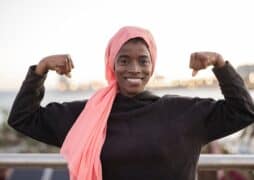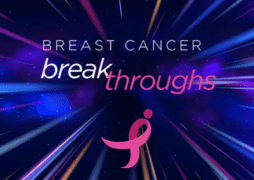Susan G. Komen has been deeply invested in supporting researchers at New York cancer institutions since its founding in 1982. Over the last forty years, Komen has awarded 209 grants, totaling $58.4 million in research, locally.
Rulla Tamimi, Sc.D, professor of population health sciences at Weill Cornell Medicine, is a Susan G. Komen grantee. She also serves as a Komen Scholar, where she is part of an advisory group of distinguished leaders in breast cancer research, clinical practice, public health, advocacy and other relevant fields.
Tamimi recently discussed her Komen-funded research and the important role diet plays in breast cancer risk.

Komen: What have you learned so far about insulin and breast cancer?
Tamimi: There are a lot of risk factors that are non-modifiable – like how many kids you had, when you had your first kid, etc., but I’ve become more interested in whether we can identify things that people can change to reduce their risk of cancer.
We’ve seen in population-based studies that there is a relationship between hyperinsulinemia – or higher than normal levels of insulin in the blood – and breast cancer. On the biological side, we know the insulin receptor is expressed in breast tumors and people with diabetes have a higher risk of developing breast cancer. In animal and lab-based studies, when you lower the insulin level in the body, either through drugs or diet, there’s a proven biologic response. So, I think it is interesting to explore if there are dietary ways to lower insulin levels, because these are actionable steps women can take to lower their risk of developing breast cancer.
Komen: How are you conducting your research to test the impact of lower insulin levels?
Tamimi: We’re looking at data sets like the Nurses’ Health Study and Nurses’ Health Study II (large studies analyzing risk factors for major chronic diseases in women), to see if certain dietary patters are associated with breast cancer risk. One part of our research involves an observational study –– where women chose their own diets and we’d be able to see over time how those food choices were related to breast cancer.
For ER-positive breast cancers, which is the majority of breast cancers, the risk of recurrence continues for a long time. We no longer say that if you’ve made it five years without a recurrence, you’re no longer at risk of recurrence. So, in the Nurses’ Health Studies, we can see what diet a person self-reported to us and how that diet is related to their long-term risk of recurrence.
Another part our study is a dietary intervention study where women are given meals that we created so we could see if their insulin levels changed on those meals, and what impact that had on their breast cancer.
Komen: What kind of meals and diets are considered to be insulin suppressing?
Tamimi: It ends up being a lot of whole grains, green leafy vegetables – and actually coffee is a good thing. These diets are low or do not include sugar-sweetened beverages, red or processed meats, or other highly processed foods. In our dietary intervention studies, we’re focusing on the impact of a very low carbohydrate diet (or ketogenic) or low-carbohydrate diets.
Komen: It seems like there is a larger role for diet and nutrition education as part of a breast cancer diagnosis. If you have your treatment plan and surgery plan, why not have a diet plan? Especially if you’re finding that specific diets help improve the response to treatment.
Tamimi: I can completely see as part of someone’s care, the need for conversations about maintaining a healthy weight. I can also imagine someone thinking, “I’m going through chemo. I deserve the ice cream, or my favorite comfort food.” But I think it is important to be able to plant that seed, that these healthy diets are actually going to help you with side effects as well as your response to the treatment, and long-term health after breast cancer. And for women without breast cancer, by making healthy choices, you may reduce the risk of breast cancer as well as so many other chronic diseases and other cancers.



